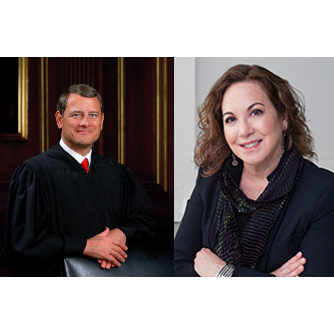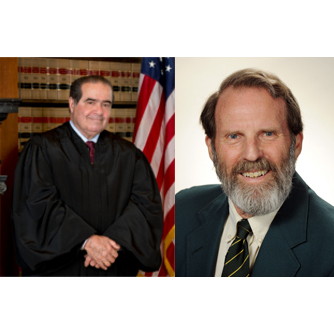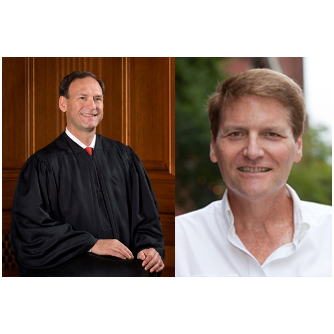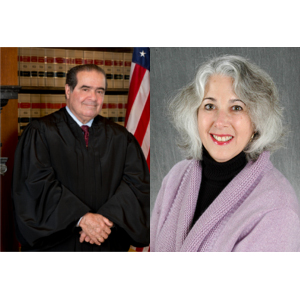Elonis v. United States
Response by Professor Catherine J. Ross Geo. Wash. L. Rev. Docket (Oct. Term 2014) Elonis v. United States, 575 U.S. ___ (2015). Docket No. 13-983; argued December 1, 2014; June 1, 2015 Slip Opinion | NY Times | SCOTUSblog This piece is featured on SCOTUSblog’s June 8th Round-Up. True Threat to Free Speech AvertedAnthony Elonis—whose vicious... Read More
Soliciting Proposals for Symposium 2015
Read Professor Orin Kerr’s relevant post on The Volokh Conspiracy here.
Equal Employment Opportunities Commission v. Abercrombie & Fitch Stores, Inc.
Response by Professor Alan B. Morrison Geo. Wash. L. Rev. Docket (Oct. Term 2014) Equal Employment Opportunities Commission v. Abercrombie & Fitch Stores, Inc., 575 U.S. ___ (2015). Docket No. 14-86; argued February 25, 2015; June 1, 2015 Slip Opinion | SCOTUSblog The facts of EEOC v. Abercrombie & Fitch, decided June 1, 2015, look like... Read More
Comptroller of the Treasury of Maryland v. Wynne et ux
Response by Professor Neil H. Buchanan Geo. Wash. L. Rev. Docket (Oct. Term 2014) Comptroller of the Treasury of Maryland v. Wynne et ux, 575 U.S. ___ (2015). Docket No. 13-485; argued November 12, 2014; decided May 18, 2015 Slip Opinion | Verdict | SCOTUSblog An Odd Remedy That Does Not Solve the Supposed ProblemFor constitutional... Read More
Armstrong v Exceptional Child, Inc.
Response by Professor Sara Rosenbaum Geo. Wash. L. Rev. Docket (Oct. Term 2014) Armstrong v. Exceptional Child, Inc., 575 U.S. ___ (2015). Docket No. 14-15; argued January 20, 2015; decided March 31, 2015 Slip Opinion | Kaiser Family Foundation | SCOTUSblog Medicaid, Judicial Equity, and the United States Supreme CourtArmstrong v. Exceptional Child Center,1 decided on... Read More
UPDATED: Bloomberg & NY Times Run Stories on GWLR Article
We are very excited that the New York Times has published a story “Lawyers with Lowest Pay Report More Happiness” based on Professors Lawrence S. Krieger & Kennon M. Sheldon George Washington Law Review article What Makes Lawyers Happy?, 83 Geo. Wash. L. Rev. 554 (2015). The New York Times Well Blog also interviewed George... Read More
Throwing Out the Playbook: Replacing the NCAA’s Anticompetitive Amateurism Regime with the Olympic Model
Alex Moyer 83 Geo. Wash. L. Rev. 761 With annual revenues exceeding twelve billion dollars, the college sports industry is the highest-grossing sports enterprise in the United States, consistently outpacing professional leagues like the NFL and NBA. This highly commercialized environment helps to line the coffers of the NCAA, athletic conferences, and universities, while making... Read More
The Consequences of Search Bias: How Application of the Essential Facilities Doctrine Remedies Google’s Unrestricted Monopoly on Search in the United States and Europe
Lisa Mays 83 Geo. Wash. L. Rev. 721 Google’s monopoly over Internet search is a serious issue. Tech policy experts describe the Internet as today’s equivalent of electricity. Consumers rely on the Internet for social communication, education, work, entertainment, and news. Thus, as consumers deserve fair access to electricity, they should be able to access... Read More
(A)rising Above the Well-Pleaded Complaint: A Proposal to Reconsider the Jurisdictional Analysis of the Federal Circuit After the America Invents Act
Kolya Glick 83 Geo. Wash. L. Rev. 686 At the intersection of civil procedure and patent law lies the unique appellate jurisdiction of the Federal Circuit. Congress granted the Federal Circuit jurisdiction over patent law appeals in 28 U.S.C. § 1295(a)(1) with the passage of the Federal Courts Improvement Act in 1982. Since then, the... Read More
Fighting Feres: Creating a VA Benefits Program for the Children of Servicemembers Injured by Parental Exposure
Mia Donnelly 83 Geo. Wash. L. Rev. 647 In 1948 Congress enacted the FTCA, finally cracking open courthouse doors to private individuals injured by the negligent or wrongful acts of federal government employees. A mere two years later, however, the Supreme Court decided Feres v. United States and significantly cut back on this privilege by... Read More




